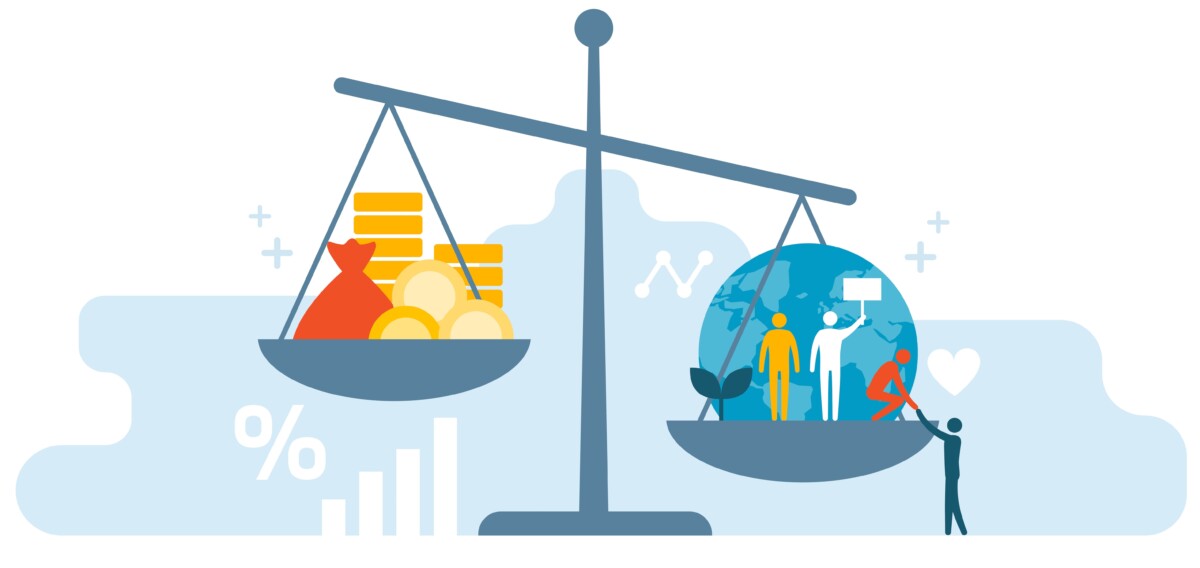Business Activism Brings Benefits and Blowback
Corporations may start choosing their battles more carefully. A Q&A with Timothy Werner, Professor of Business, Government, and Society
by Steve Brooks
When The Walt Disney Company criticized Florida’s restrictions on discussing LGBTQ+ issues in schools, it got political blowback from the right. When the CEO of Goya Foods praised then-President Donald Trump, his company faced boycott calls from the political left.
It’s not new for corporations to get involved in social and political issues, says Timothy Werner, professor of business, government, and society at Texas McCombs. He has studied companies’ social responsibility reputations and their executives’ campaign contributions.
But their involvement has changed dramatically in recent years, he says. Lines between lobbying and social activism have blurred. Corporations have taken stands on hot-button topics that aren’t connected to their core businesses.
In a recent article, Werner proposed a new paradigm for understanding these new activities: corporate social and political engagement (CSPE). In a conversation about his research, he explains how CSPE is a model that blends old-fashioned lobbying with the idea of corporate social responsibility (CSR), and he predicts that businesses may start taking fewer controversial stances.
Q What has your research found about the evolution of political activity as a business strategy?
The study of corporate political activity, such as lobbying, dates back to the mid-1960s. Essentially, it takes a viewpoint that we can model political outcomes much the way we model economic outcomes, in the sense that you could view politics as a market, and you have suppliers and demanders. Firms just happen to be a very powerful demander in that marketplace.
Around the same time, the idea of corporate social responsibility took root. But CSR was more concerned about ethical questions on the role of business in society, on what firms should be doing.
Over time, CSR has evolved to have more of a strategic angle. The phrase “environmental, social, and governance” has cropped up. ESG frames itself as shared value. You can do stuff that’s “good for society,” provided it also creates value for the owners of the corporation. There is some payoff to your firm and its stakeholders in the short or long run.
Q What might such a payoff look like?
Walmart is converting some of its fleet from traditional diesel fuel to alternative fuels that have less environmental impact. In reducing its energy use, it also saves about a billion dollars a year.
Another example is that by adopting CSR programs and addressing public policy problems, firms are often able to pre-empt regulation. By regulating themselves, they avoid a lot of compliance costs and monitoring and potential penalties. For example, consider the Motion Picture Association of America. Its rating system for films is entirely self-regulatory.
Q How are political and social activity — which you’ve dubbed CSPE — coming together now?
When both these areas of inquiry started, these functions were generally separated in any major corporation. Corporate political activity often would have been under the legal department, whereas CSR would have more likely been in marketing. There was no coordination within the organization.
What has happened, since about 2000, is that firms have had to integrate them. That’s partly due to companies becoming more sophisticated in both areas. The other big driver has been increasing external pressure to be more engaged, due to social movements and political polarization.
Today, more and more firms have a C-suite officer who deals with these issues. The person in that role for a major retailer recently told me that their CEO has spent more time on sociopolitical issues in the last year than anything else.
Q How’s that working for them?
It’s difficult. There’s pressure coming from all quarters, and it’s often pointed in opposite directions. They want to be responsive to critical stakeholders, like employees whose political beliefs may be slightly more liberal than the country as a whole. But then, these firms have to interact with political institutions that are slightly more conservative than average. Those policymakers are also key stakeholders.
Q Like Disney’s dispute with Florida?
Yes, I think that is a great example of what not to do, because Disney didn’t take its public stand until after the legislation had actually passed. At best, they could hope to get the employees who raised the issue off their back. But the risk they ran was to alienate the governor of their home state. It shows the limits of what corporations can hope to get out of this, because I think Disney is a little bit worse off than it was before. [Editor’s note: Disney recently accepted partial oversight by a state board.]
Q Where do you see CSPE going in the near future?
I think that taking stances on issues that aren’t related to their core business is falling out of fashion. If you think of it like a wave, it’s already crested, and it’s starting to fall. My advice, most of the time, is to stay out of any political issue unless it has a clear economic rationale for the firm.

Q Are there political issues where a company does have a clear economic rationale for getting engaged?
There’s the climate change problem. Climate change mitigation and adaptation are going to have an impact on returns for your investors. So, you have a fiduciary duty in the medium to long term to be thinking about climate change.
Q Can CSPE take other forms than public activism?
If you still need to engage in politics, you may look for ways that are less visible. For example, a lot of research has come out in the last few years on corporate philanthropy. Charitable foundations associated with corporations strategically target their contributions to charities in the districts of important members of Congress. They encourage those charities to participate in the political process to the degree that they are legally able.
Q Lastly, how is the CSPE paradigm changing your research agenda?
Corporations have restructured how they do this, so we have to restructure how we study it. One interesting question is how well their CSR commitments are aligned with their political advocacy. How many of these firms are talking green while they’re lobbying against efforts to address, say, climate change?
I’m working on a project with three co-authors where we’re using machine learning to read bills and the positions firms take on them with their lobbying. Then, we’re using similar techniques to analyze things like their CSR and ESG reports. We hope to see what causes alignment or misalignment, and what the consequences of that are.
About this Post
Share:


